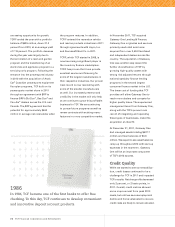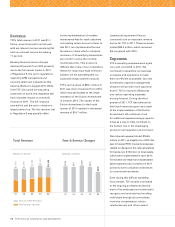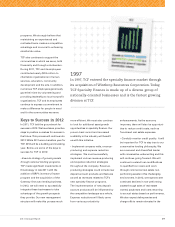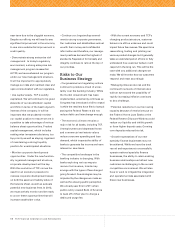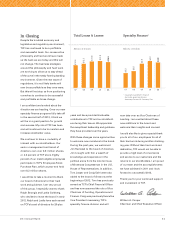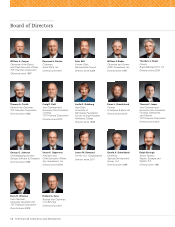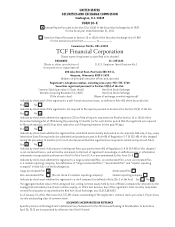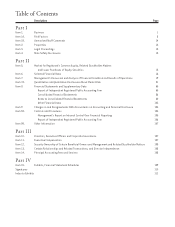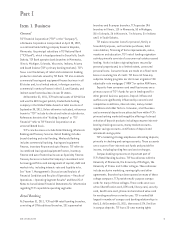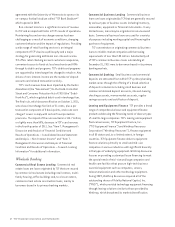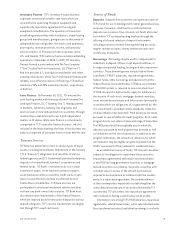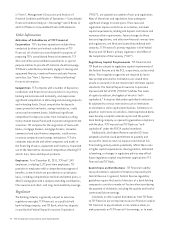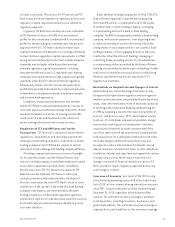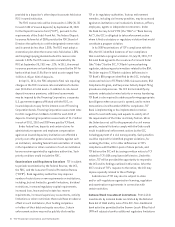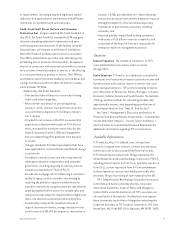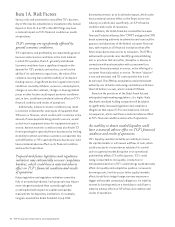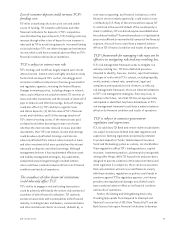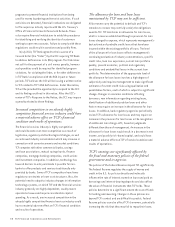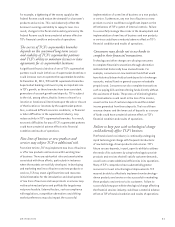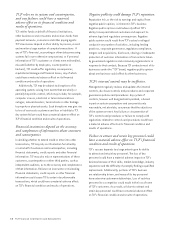TCF Bank 2011 Annual Report Download - page 20
Download and view the complete annual report
Please find page 20 of the 2011 TCF Bank annual report below. You can navigate through the pages in the report by either clicking on the pages listed below, or by using the keyword search tool below to find specific information within the annual report.agreement with the University of Minnesota to sponsor its
on-campus football stadium called “TCF Bank Stadium®”
which opened in 2009.
Non-interest income is a significant source of revenue
for TCF and an important factor in TCF’s results of operations.
Maintaining fee and service charge revenue has been
challenging as a result of economic conditions, changing
customer behavior and the impact of regulations. Providing
a wide range of retail banking services is an integral
component of TCF’s business philosophy and a major
strategy for generating additional non-interest income.
TCF offers retail checking account customers inexpensive,
convenient access to funds at local merchants and ATMs
through its debit card programs. TCF’s debit card programs
are supported by interchange fees charged to retailers. Key
drivers of non-interest income are the number of deposit
accounts and related transaction activity.
TCF’s card revenues have been impacted by the Durbin
Amendment (the “Amendment”) to the Dodd-Frank Wall
Street and Consumer Protection Act of 2010 (the “Dodd-
Frank Act”), which regulated debit-card interchange fees.
The final rule, which became effective on October 1, 2011,
sets a base interchange fee limit of 21 cents, plus a per
transaction component of 5 basis points, and a one cent
charge if issuers comply with certain fraud protection
provisions. The impact of the rule resulted in a $14.7 million,
or slightly more than 50%, decrease in TCF’s card revenue
in the fourth quarter of 2011. See “Item 7. Management’s
Discussion and Analysis of Financial Condition and
Results of Operations — Consolidated Income Statement
and Analysis — Non-Interest Income” and “Item 7.
Management’s Discussion and Analysis of Financial
Condition and Results of Operations — Forward-Looking
Information” for additional information.
Wholesale Banking
Commercial Real Estate Lending Commercial real
estate loans are loans originated by TCF that are secured
by commercial real estate including retail centers, multi-
family housing, office buildings and, to a lesser extent,
commercial real estate construction loans, mainly to
borrowers based in its primary banking markets.
Commercial Business Lending Commercial business
loans are loans originated by TCF that are generally secured
by various types of business assets including inventory,
receivables, equipment or financial instruments. In very
limited cases, loans may be originated on an unsecured
basis. Commercial business loans are used for a variety
of purposes including working capital and financing the
purchase of equipment.
TCF concentrates on originating commercial business
loans to middle-market companies with borrowing
requirements of less than $25 million. Substantially all
of TCF’s commercial business loans outstanding at
December 31, 2011 were to borrowers based in its primary
banking markets.
Commercial Banking Small business and commercial
deposits are attracted from within TCF’s primary banking
market areas through the offering of a broad selection
of deposit instruments including small business and
commercial demand deposit accounts, interest-bearing
checking accounts, money market accounts, regular
savings accounts and certificates of deposit.
Leasing and Equipment Finance TCF provides a broad
range of comprehensive lease and equipment finance
products addressing the financing needs of diverse types
of small to large companies. TCF’s leasing and equipment
finance businesses, TCF Equipment Finance, Inc.
(“TCF Equipment Finance”) and Winthrop Resources
Corporation (“Winthrop Resources”), finance equipment
in all 50 states and, to a limited extent, in foreign
countries. TCF Equipment Finance delivers equipment
finance solutions primarily to small and mid-size
companies in various industries with significant diversity
in the types of underlying equipment. Winthrop Resources
focuses on providing customized lease financing to meet
the special needs of mid-size and large companies and
health care facilities that procure high-tech business
essential equipment such as computers, servers,
telecommunication and other technology equipment.
During 2009, Winthrop Resources acquired all of the
outstanding shares of Fidelity National Capital, Inc.
(“FNCI”), which provided technology equipment financing
through leasing solutions similar to those provided by
Winthrop, which broadened its market diversification.
2 TCF Financial Corporation and Subsidiaries


